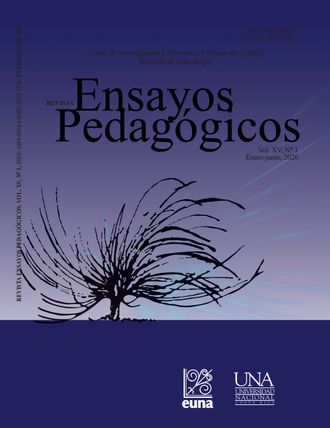Christian Tradition and Education for Human Rights: Criticism to Nietzsche's Moral Sense
DOI:
https://doi.org/10.15359/rep.15-1.6Keywords:
moral values, moral education, social welfare, chrsitianity, philosophy of educationAbstract
The philosophy of human rights contains the contribution of different traditions of thought that have contributed to the moral progress of humanity. And among them is the Christian tradition, which contributed to the concept of person and its inherent universal dignity. However, there are thinkers who deny the moral potential of this perspective, so this essay will address the thinking of one of them. So, the objective of this essay is to contrast the axiological ideas of the philosopher Friedrich Nietzsche with the essence of Christian morality and its contribution to human rights education. Thus, it is discovered that it is not true that the Christian moral sense is aimed at weakening or making people sick, but that it is oriented towards their moral strengthening. Precisely, this is done in order for them to overcome the vital or physiological limitations that make it difficult to sacrifice subjective well-being for an objective well-being at the individual and collective levels. Otherwise, if nature is not transcended, it is not possible to aspire to spiritual ends, such as universal fraternity. Consequently, it is recognized that it is fundamental to foster an inalienable philosophical attitude towards human rights in pedagogical contexts.
References
Amilburu, M. (2014). Filosofía y actitud filosófica: sus aportaciones a la educación. Revista Española de Pedagogía, 72(258), 231-247.
Aristóteles. (2011). Política. Barcelona: Espasa-Calpe.
Baigorri, J.; Cifuentes, L.; Ortega, P.; Pichel, J. y Trapiello, V. (1995). Temas de Filosofía Cou. Madrid: Ediciones del Laberinto.
Bazán, D. (2003). La participación política de los creyentes: esbozo de una fundamentación ético-religiosa. Paulo Freire. Revista de Pedagogía Crítica, 2, 49-59.
Beuchot, M. (2004). Filosofía y derechos humanos (5.ª ed.). Buenos Aires: Siglo XXI.
Cortina, A. (2006). Ciudadanía Intercultural. Philosophica, 27, 7-15.
Cortina, A. (2017). Aporofobia, el rechazo al pobre. Un desafío para la democracia. Barcelona: Paidós.
De la Fuente, E. B. (2018). Crist(ian)ofobia: más que un fenómeno cultural. Fides et Ratio: revista anual de Teología, Doctrina Social de la Iglesia, Ética y Deontología Profesional, 3, 25-43.
De La Torre, J. (2005). Iusnaturalismo, personalismo y filosofía de la liberación. Una visión integradora. Madrid: MAD.
Del Valle, A. (2012). La nueva cristianofobia, ¿una modalidad del odio a Occidente? Debats, 117, 78-89.
Ezcurdia, J. (1987). Curso de derecho natural. Perspectivas iusnaturalistas de los derechos humanos. Madrid: Reus.
Hartmann, N. (2011). Ética. Madrid: Encuentro.
Kierkegaard, S. (1988). Mi punto de vista. Madrid: Aguilar.
Mari, G. (2014). La aportación del concepto de <> a la educación intercultural. Revista Española de Pedagogía, 72(258), 299-313.
Marina, J. A. (2005). Por qué soy cristiano. Teoría de la doble verdad. Barcelona: Anagrama.
Martín, A. (2009). Magister vitae. La era de la “cristofobia”. La Razón histórica: revista hispanoamericana de historia de las ideas políticas y sociales, 6, 2-4.
Messer, A. (1933). Fundamentos Filosóficos de la Pedagogía (2.ª ed.). Barcelona: Labor.
Mujica, F. (2019a). Suscitar buenas emociones en la educación formal: Análisis según la ética de Max Scheler. Revista Dilemas Contemporáneos: Educación, Política y Valores, 6(3), 1-15.
Mujica, F. (2019b). Formación emocional con un sentido moral humanista-cristiano: Análisis en función del amor. Paulo Freire. Revista de Pedagogía Crítica, 21, 126-141.
Mujica, F. (2019c). El sentido moral que James Naismith otorgó al Baloncesto: Una fortaleza para su desarrollo en España y en la Educación Física. EmásF. Revista Digital de Educación Física, 56, 92-103.
Mujica, F.; Orellana, N. y Luis-Pascual, J. C. (2019). Perspectiva moral de las emociones en los contextos de educación formal. Ensayos Pedagógicos, 14(1), 69-90. doi: https://doi.org/10.15359/rep.14-1.4
Nietzsche, F. (2011). Así habló Zaratustra. Madrid: Alianza.
Nietzsche, F. (2014). El anticristo. Una maldición sobre el cristianismo. Zarátamo: Maceda.
Olivera, J. (1998). ¿Quién es D. José María Cagigal? Artículo presentado en el Simposio internacional de consenso “José María Cagigal”. A Coruña: Universidade Da Coruña. Recuperado de https://ruc.udc.es/dspace/handle/2183/9752.
Ortega y Gasset, J. (2003). ¿Qué es filosofía? Madrid: Espasa-Calpe.
Papacchini, A. (2003). Filosofía y Derechos Humanos. Cali: Universidad del Valle.
Pascal. (1967). Pensamientos. Madrid: Espasa-Calpe.
Rojas, E. (1993). Una teoría de la felicidad. Madrid: Dossat.
Scheler, M. (1978). El puesto del hombre en el cosmos (13.ª ed.). Buenos Aires: Losada.
Scheler, M. (2001). Ética. Nuevo ensayo de fundamentación de un personalismo ético. Madrid: Caparrós.
Scheler, M. (2005). Esencia y formas de la simpatía. Sígueme: Salamanca.
Scheler, M. (2010). Amor y conocimiento. Y otros escritos. Madrid: Palabra.
Séneca. (1984). Sobre la felicidad (4.ª ed.). Madrid: Alianza.
Stein, E. (2003). Escritos esenciales. Santander: Sal Terrae.
Stein, E. (2004). El problema de la empatía. Madrid: Trotta.
Stein, E. (2007). La estructura de la persona humana. Madrid: Biblioteca de Autores Cristianos.
Zubiri, X. (1955). Naturaleza, Historia, Dios. Madrid: Nacional.
Zubiri, X. (1962). Sobre la esencia. Madrid: Sociedad de Estudios y Publicaciones.
Zubiri, X. (1985). El Hombre y Dios. Madrid: Alianza.
Published
How to Cite
Issue
Section
License
Ensayos Pedagógicos is subscribed to the Attribution-NonCommertial-NoDerivatives 4.0 International Creative Commons Licence, which allows both authors and readers to freely download, store, copy, and distribute the final approved publisehd version of the manuscript (post-print) as long as this is done without commercial purposes, no derivative works are generated, and the source and author are mentioned. As well, Ensayos Pedagógicos declares that authors will remain the rightful owners of the copyrights of their work in perpetuity.







